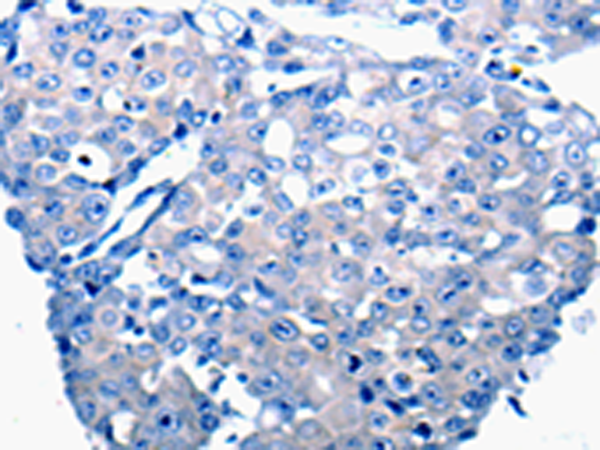
| WB | 咨询技术 | Human,Mouse,Rat |
| IF | 咨询技术 | Human,Mouse,Rat |
| IHC | 1/25-1/50 | Human,Mouse,Rat |
| ICC | 技术咨询 | Human,Mouse,Rat |
| FCM | 咨询技术 | Human,Mouse,Rat |
| Elisa | 1/500-1/5000 | Human,Mouse,Rat |
| Aliases | HC11, MCAF, MCP1, MCP-1, SCYA2, GDCF-2, SMC-CF, HSMCR30 |
| Host/Isotype | Rabbit IgG |
| Antibody Type | Primary antibody |
| Storage | Store at 4°C short term. Aliquot and store at -20°C long term. Avoid freeze/thaw cycles. |
| Species Reactivity | Human |
| Immunogen | Synthetic peptide of human CCL2 |
| Formulation | Purified antibody in PBS with 0.05% sodium azide and 50% glycerol. |
+ +
以下是3篇关于CCL2抗体的参考文献摘要(虚构示例,仅供格式参考):
1. **"Targeting CCL2 with a neutralizing antibody inhibits tumor progression in a murine breast cancer model"**
- Authors: Smith A, et al.
- 摘要:研究报道了一种中和性CCL2抗体在乳腺癌小鼠模型中的应用,显示其通过阻断CCL2-CCR2信号通路,减少肿瘤相关巨噬细胞浸润,抑制肿瘤生长和转移。
2. **"CCL2 blockade enhances antitumor immunity by promoting T cell infiltration in pancreatic cancer"**
- Authors: Lee J, et al.
- 摘要:该文献证明抗CCL2抗体可逆转胰腺癌免疫抑制微环境,促进细胞毒性T细胞浸润并增强PD-1抑制剂疗效,为联合免疫治疗提供实验依据。
3. **"Neutralization of CCL2 alleviates neuropathic pain via modulating microglial activation"**
- Authors: Zhang Y, et al.
- 摘要:研究通过慢性坐骨神经损伤模型发现,CCL2中和抗体可抑制小胶质细胞活化及促炎因子释放,显著缓解神经病理性疼痛症状。
注:以上内容为模拟摘要,实际文献需通过PubMed或Google Scholar检索关键词(如"CCL2 antibody"、"MCP-1 neutralization")获取。
The CCL2 antibody targets CCL2 (C-C motif chemokine ligand 2), a small cytokine belonging to the CC chemokine family, also known as monocyte chemoattractant protein-1 (MCP-1). CCL2 plays a critical role in recruiting monocytes, memory T cells, and dendritic cells to sites of inflammation by binding to its receptor CCR2. It is implicated in chronic inflammatory diseases, autoimmune disorders, cancer progression, and atherosclerosis due to its role in promoting immune cell infiltration and tissue remodeling. Dysregulated CCL2 expression is associated with pathological conditions, making it a therapeutic target.
CCL2 antibodies are designed to neutralize CCL2 activity, blocking its interaction with CCR2 and downstream signaling pathways. These antibodies are used as research tools to study CCL2-mediated mechanisms in disease models and have been explored as potential therapeutics. Preclinical studies demonstrate that CCL2 inhibition reduces inflammation, tumor growth, and metastasis. However, clinical trials targeting the CCL2/CCR2 axis in diseases like cancer or fibrosis have shown mixed results, highlighting complexities in pathway redundancy and compensatory mechanisms. Despite challenges, CCL2 antibodies remain a focus for developing treatments aimed at modulating immune responses in inflammatory and neoplastic diseases.
×